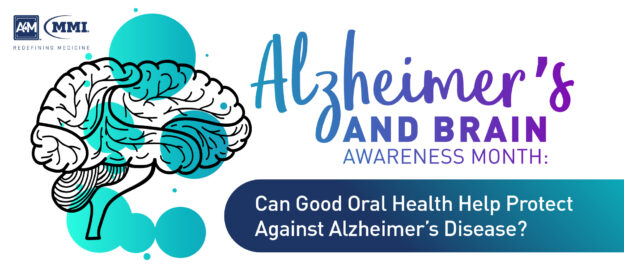The month of June observes Alzheimer’s and Brain Awareness Month recognizing the over 50 million people living with Alzheimer’s disease (AD) and other forms of dementia worldwide. Organizers of the campaign work to ameliorate a global lack of understanding of neurodegenerative diseases; they strive to inform, educate, and provide support for dementia sufferers and their loved ones.
A growing body of research has been able to identify several factors that may contribute to the development of the condition. Diabetes, hypertension, obesity, depression, cognitive inactivity, and other modifiable risk factors have all been associated with dementia, while many others are under investigation.
The latest research points to the common gum disease gingivitis – which affects over 50% of all adults – as another potential cause of Alzheimer’s disease. The possible correlation between oral health and dementia development was revealed in a study published in Sciences Advances, which explored the neurotoxic effects of Porphyromonas gingivalis – the keystone pathogen in gingivitis.
Porphyromonas gingivalis in Alzheimer’s Disease Brains
Inflammation of the gums caused by bacterial plaque on the surface of the teeth is quite common and usually reversible, however, when left untreated it may lead to severe health repercussions. Prior studies have linked gum disease with an increased risk of cardiovascular disease with patients who experience gingivitis facing a two to three-fold higher risk of cardiovascular events. Researchers have previously found that the bacteria are able to move from the mouth to the brain, where they release gingipains – enzymes that destroy nerve cells, leading to memory loss and the development of dementia.
The latest study aimed to determine the prevalence of P. gingivalis bacteria in AD patients and its potential neurotoxic effects. A team of researchers employed by the pharmaceutical company Cortexyme examined post-mortem brain tissue of 53 diagnosed Alzheimer’s patients, testing them for the presence of two types of gingipains – toxic proteases produced by P. gingivalis. The concentration of both gingipain proteins was significantly higher in patients with Alzheimer’s disease. Investigators found gingipains in 91% and 96% (for each of the two proteins) of the brain tissue samples Alzheimer’s patients compared with 39% and 52% in the control group. The concentration of gingipains tended to rise over time, indicating that there may be a threshold for the beginning of dementia symptoms, researchers reported.
In addition, researchers conducted experiments on mice to determine whether infecting them with P. gingivalis through the mouth would lead to the presence of bacteria in the brain over a period of 6 weeks. All of the 8 mice infected with P. gingivalis showed signs of brain infection at the 6-week mark. Afterward, investigators treated the mice with either a gingipain-inhibiting substance or the antibiotic moxifloxacin – a recommended treatment for gingivitis. In mice given the inhibitory substance by mouth twice daily, the brain infection was treated and bacterial levels were reduced – at a higher rate than for those treated with antibiotics.
In order to mitigate the neurotoxicity of P. gingivalis, investigators designed small-molecule inhibitors to specifically target gingipains. Mice treated with the substance showed reduced bacterial levels, blocked Aβ production, reduced neuroinflammation, and rescued neurons in the hippocampus. These findings implicate that gingipain inhibitors may be an efficacious method for treating P. gingivalis brain infection and the subsequent neurodegeneration leading to Alzheimer’s disease.
Although the research is still preliminary, the study’s findings underscore the importance of maintaining good oral health, not just for hygienic purposes and tooth decay prevention, but also for the reduction of Alzheimer’s disease risk. Forthcoming research will aim to determine whether a gingipain-inhibiting drug – such as the one used in the trial – can possibly mitigate Alzheimer’s development or at least decelerate disease progression. In the meantime, practicing good oral hygiene by flossing frequently, brushing teeth twice daily, and attending routine dental check-ups can help prevent the formation of gingivitis and reduce the risk of other potential health consequences.

